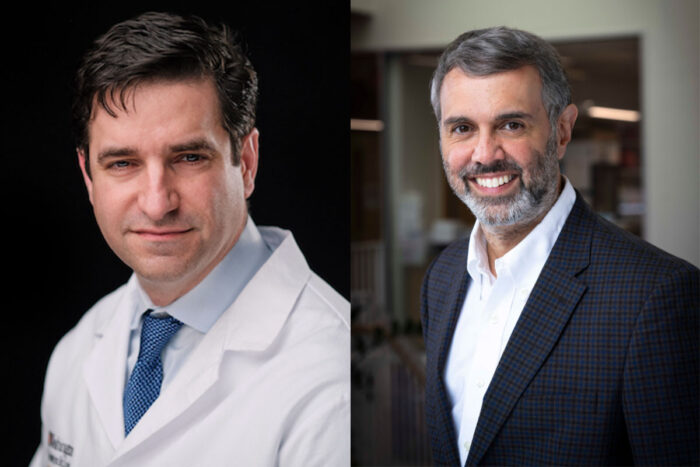Leuthardt, Mitra selected as AIMBE fellows
Prestigious biomedical engineering institute recognizes outstanding contributions to the field

WashU Medicine’s Eric C. Leuthardt, MD (left), the Shi H. Huang Professor of Neurological Surgery in the Taylor Family Department of Neurosurgery, and Robi Mitra, PhD, the Alvin Goldfarb Distinguished Professor of Computational Biology in the Department of Genetics, have been named fellows of the American Institute for Medical and Biological Engineering.
The American Institute for Medical and Biological Engineering (AIMBE) has named two new fellows from Washington University School of Medicine in St. Louis. The two faculty members join 30 of their WashU colleagues already in the organization, including seven who were inducted last year.
Robi Mitra, PhD, the Alvin Goldfarb Distinguished Professor of Computational Biology in the Department of Genetics, and Eric C. Leuthardt, MD, the Shi H. Huang Professor of Neurological Surgery, will be inducted March 31 in Arlington, Va. along with 169 other new fellows from across the United States.
The AIMBE’s College of Fellows is highly selective; candidates are nominated each year by their peers for their outstanding contributions to engineering and medical research, practice or education.
Mitra uses experimental and computational methods to understand the fundamental mechanisms that control gene regulation and how they go awry in disease. Mitra has developed effective new genomic technologies, including the earliest experiment pioneering next-generation sequencing, which is a technology that has reduced the cost of DNA sequencing by several orders of magnitude. He has applied that technology to address a variety of problems in diagnostics, genomics and gene regulation. He owns or co-owns more than 20 patents, which have been derived from his work.
Mitra is a leader of genomic science at WashU Medicine, having played significant roles in the establishment and growth of the Genome Technology Access Center, the Genomics and Pathology Services Lab and the Genome Engineering and Stem Cell Center.
Leuthardt is a neurosurgeon and inventor who owns or co-owns more than 600 patents. His work includes a wide range of different types of neurotechnology, including brain-computer interfaces, advanced brain mapping solutions and novel neuromodulation devices to improve diagnoses and treatments for neurological diseases and injuries. He is a co-inventor of the IpsiHand, which was the first FDA-approved Brain Computer Interface. He also is the inventor of NeuroAccess, a device that uses ultrasound to increase the permeability of the blood-brain barrier so that biomolecules can leave the brain and enter the patient’s bloodstream where they can be collected and analyzed by physicians. Both of these devices received a “Breakthrough Device” designation from the FDA.
Leuthardt is vice-chair for innovation and chief of the Division of Neurotechnology in the Taylor Family Department of Neurosurgery and director of the Center for Innovation in Neuroscience and Technology.






